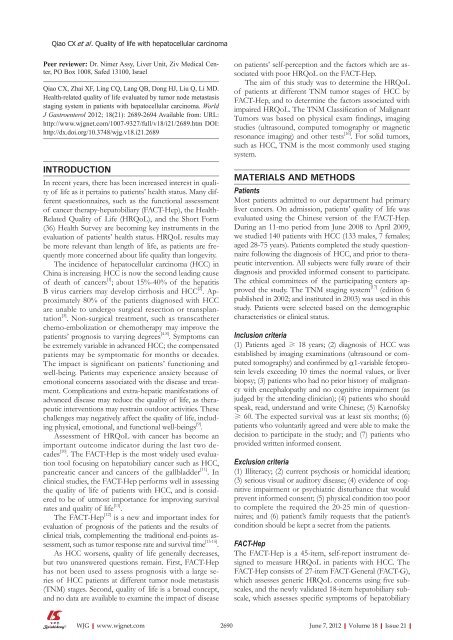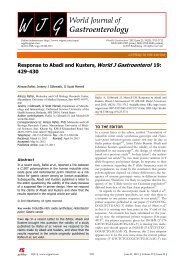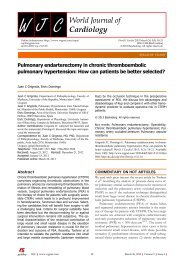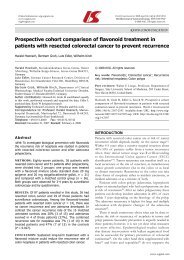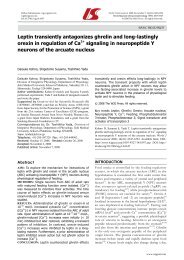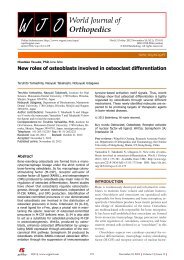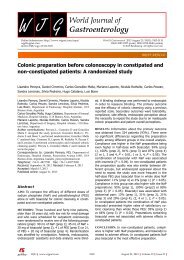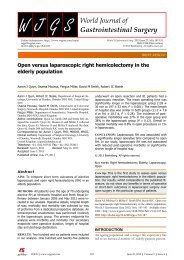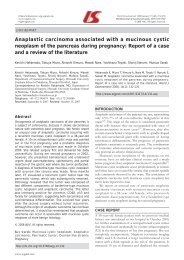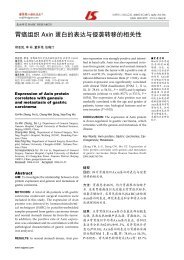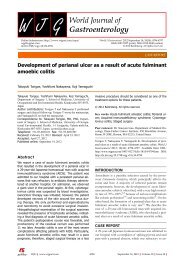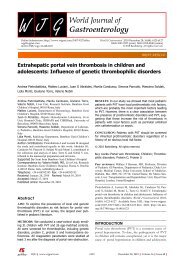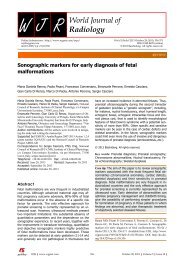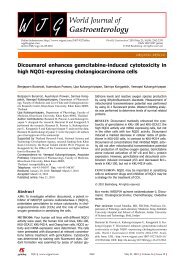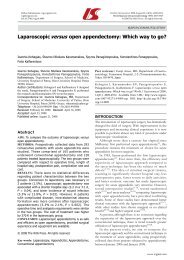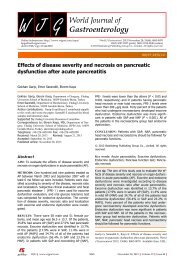Evidence base and patients' perspective - World Journal of ...
Evidence base and patients' perspective - World Journal of ...
Evidence base and patients' perspective - World Journal of ...
Create successful ePaper yourself
Turn your PDF publications into a flip-book with our unique Google optimized e-Paper software.
Qiao CX et al . Quality <strong>of</strong> life with hepatocellular carcinoma<br />
Peer reviewer: Dr. Nimer Assy, Liver Unit, Ziv Medical Center,<br />
PO Box 1008, Safed 13100, Israel<br />
Qiao CX, Zhai XF, Ling CQ, Lang QB, Dong HJ, Liu Q, Li MD.<br />
Health-related quality <strong>of</strong> life evaluated by tumor node metastasis<br />
staging system in patients with hepatocellular carcinoma. <strong>World</strong><br />
J Gastroenterol 2012; 18(21): 2689-2694 Available from: URL:<br />
http://www.wjgnet.com/1007-9327/full/v18/i21/2689.htm DOI:<br />
http://dx.doi.org/10.3748/wjg.v18.i21.2689<br />
INTRODUCTION<br />
In recent years, there has been increased interest in quality<br />
<strong>of</strong> life as it pertains to patients’ health status. Many different<br />
questionnaires, such as the functional assessment<br />
<strong>of</strong> cancer therapy-hepatobiliary (FACT-Hep), the Health-<br />
Related Quality <strong>of</strong> Life (HRQoL), <strong>and</strong> the Short Form<br />
(36) Health Survey are becoming key instruments in the<br />
evaluation <strong>of</strong> patients’ health status. HRQoL results may<br />
be more relevant than length <strong>of</strong> life, as patients are frequently<br />
more concerned about life quality than longevity.<br />
The incidence <strong>of</strong> hepatocellular carcinoma (HCC) in<br />
China is increasing. HCC is now the second leading cause<br />
<strong>of</strong> death <strong>of</strong> cancers [1] ; about 15%-40% <strong>of</strong> the hepatitis<br />
B virus carriers may develop cirrhosis <strong>and</strong> HCC [2] . Approximately<br />
80% <strong>of</strong> the patients diagnosed with HCC<br />
are unable to undergo surgical resection or transplantation<br />
[3] . Non-surgical treatment, such as transcatheter<br />
chemo-embolization or chemotherapy may improve the<br />
patients’ prognosis to varying degrees [4-8] . Symptoms can<br />
be extremely variable in advanced HCC; the compensated<br />
patients may be symptomatic for months or decades.<br />
The impact is significant on patients’ functioning <strong>and</strong><br />
well-being. Patients may experience anxiety because <strong>of</strong><br />
emotional concerns associated with the disease <strong>and</strong> treatment.<br />
Complications <strong>and</strong> extra-hepatic manifestations <strong>of</strong><br />
advanced disease may reduce the quality <strong>of</strong> life, as therapeutic<br />
interventions may restrain outdoor activities. These<br />
challenges may negatively affect the quality <strong>of</strong> life, including<br />
physical, emotional, <strong>and</strong> functional well-beings [9] .<br />
Assessment <strong>of</strong> HRQoL with cancer has become an<br />
important outcome indicator during the last two decades<br />
[10] . The FACT-Hep is the most widely used evaluation<br />
tool focusing on hepatobiliary cancer such as HCC,<br />
pancreatic cancer <strong>and</strong> cancers <strong>of</strong> the gallbladder [11] . In<br />
clinical studies, the FACT-Hep performs well in assessing<br />
the quality <strong>of</strong> life <strong>of</strong> patients with HCC, <strong>and</strong> is considered<br />
to be <strong>of</strong> utmost importance for improving survival<br />
rates <strong>and</strong> quality <strong>of</strong> life [11] .<br />
The FACT-Hep [12] is a new <strong>and</strong> important index for<br />
evaluation <strong>of</strong> prognosis <strong>of</strong> the patients <strong>and</strong> the results <strong>of</strong><br />
clinical trials, complementing the traditional end-points assessment,<br />
such as tumor response rate <strong>and</strong> survival time [13-15] .<br />
As HCC worsens, quality <strong>of</strong> life generally decreases,<br />
but two unanswered questions remain. First, FACT-Hep<br />
has not been used to assess prognosis with a large series<br />
<strong>of</strong> HCC patients at different tumor node metastasis<br />
(TNM) stages. Second, quality <strong>of</strong> life is a broad concept,<br />
<strong>and</strong> no data are available to examine the impact <strong>of</strong> disease<br />
WJG|www.wjgnet.com<br />
on patients’ self-perception <strong>and</strong> the factors which are associated<br />
with poor HRQoL on the FACT-Hep.<br />
The aim <strong>of</strong> this study was to determine the HRQoL<br />
<strong>of</strong> patients at different TNM tumor stages <strong>of</strong> HCC by<br />
FACT-Hep, <strong>and</strong> to determine the factors associated with<br />
impaired HRQoL. The TNM Classification <strong>of</strong> Malignant<br />
Tumors was <strong>base</strong>d on physical exam findings, imaging<br />
studies (ultrasound, computed tomography or magnetic<br />
resonance imaging) <strong>and</strong> other tests [16] . For solid tumors,<br />
such as HCC, TNM is the most commonly used staging<br />
system.<br />
MATERIALS AND METHODS<br />
Patients<br />
Most patients admitted to our department had primary<br />
liver cancers. On admission, patients’ quality <strong>of</strong> life was<br />
evaluated using the Chinese version <strong>of</strong> the FACT-Hep.<br />
During an 11-mo period from June 2008 to April 2009,<br />
we studied 140 patients with HCC (133 males, 7 females;<br />
aged 28-75 years). Patients completed the study questionnaire<br />
following the diagnosis <strong>of</strong> HCC, <strong>and</strong> prior to therapeutic<br />
intervention. All subjects were fully aware <strong>of</strong> their<br />
diagnosis <strong>and</strong> provided informed consent to participate.<br />
The ethical committees <strong>of</strong> the participating centers approved<br />
the study. The TNM staging system [17] (edition 6<br />
published in 2002; <strong>and</strong> instituted in 2003) was used in this<br />
study. Patients were selected <strong>base</strong>d on the demographic<br />
characteristics or clinical status.<br />
Inclusion criteria<br />
(1) Patients aged ≥ 18 years; (2) diagnosis <strong>of</strong> HCC was<br />
established by imaging examinations (ultrasound or computed<br />
tomography) <strong>and</strong> confirmed by α1-variable fetoprotein<br />
levels exceeding 10 times the normal values, or liver<br />
biopsy; (3) patients who had no prior history <strong>of</strong> malignancy<br />
with encephalopathy <strong>and</strong> no cognitive impairment (as<br />
judged by the attending clinician); (4) patients who should<br />
speak, read, underst<strong>and</strong> <strong>and</strong> write Chinese; (5) Karn<strong>of</strong>sky<br />
≥ 60. The expected survival was at least six months; (6)<br />
patients who voluntarily agreed <strong>and</strong> were able to make the<br />
decision to participate in the study; <strong>and</strong> (7) patients who<br />
provided written informed consent.<br />
Exclusion criteria<br />
(1) Illiteracy; (2) current psychosis or homicidal ideation;<br />
(3) serious visual or auditory disease; (4) evidence <strong>of</strong> cognitive<br />
impairment or psychiatric disturbance that would<br />
prevent informed consent; (5) physical condition too poor<br />
to complete the required the 20-25 min <strong>of</strong> questionnaires;<br />
<strong>and</strong> (6) patient’s family requests that the patient’s<br />
condition should be kept a secret from the patients.<br />
FACT-Hep<br />
The FACT-Hep is a 45-item, self-report instrument designed<br />
to measure HRQoL in patients with HCC. The<br />
FACT-Hep consists <strong>of</strong> 27-item FACT-General (FACT-G),<br />
which assesses generic HRQoL concerns using five subscales,<br />
<strong>and</strong> the newly validated 18-item hepatobiliary subscale,<br />
which assesses specific symptoms <strong>of</strong> hepatobiliary<br />
2690 June 7, 2012|Volume 18|Issue 21|


